Pet Wellness Services
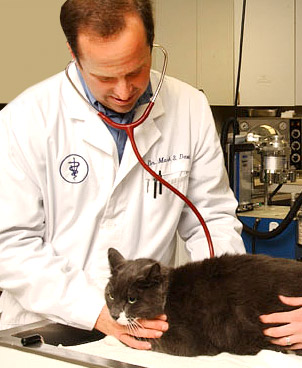 Optimal Wellness Programs for Your Pet
Optimal Wellness Programs for Your Pet
At South Fork Animal Hospital, the focus of our attention is on prevention and wellness. Our veterinarians use a personalized approach to high-quality pet care based on your pet's lifestyle. From the first visit, your pet is evaluated in terms of daily routines, life stage and risk factors.
Your pet should receive a veterinary wellness exam at least once a year. Senior pets should be examined every six months. Annual or semi-annual wellness examinations for your pet at our animal hospital are your veterinarian's chance to assess your pet's overall health, discuss any changes, educate and update you on advancements in medical care, and for you to discuss any concerns or questions.
Your pet's wellness examination at South Fork Hospital includes your veterinarian's commitment to:
- Examine your pet's teeth, throat and oral cavity
- Check your pet's vision and examine the eyes
- Examine your pet’s ears for infection, ear mites, allergic reaction and other related health issues
- Examine your pet’s respiratory system
- Assess your pet's heart and evaluate cardiac function
- Test your pet's reflexes
- Palpate your pet’s lymph nodes and abdomen
- Inspect your pet’s skin
- Palpate your pet’s joints and muscles for arthritis and other orthopedic conditions
- Test to evaluate the function of your pet’s internal organs and other systems
- Assess changes in your pet's body weight, appetite, urination and bowel habits
- Inquire as to your pet's activity level
- Check your pet’s skin for unusual growth developments
- Monitor your pet's blood count
- Utilize laboratory testing to detect early signs of Lyme or Heartworm disease
- Assess and evaluate general or specific changes in your pet's health since the last wellness visit
- Discuss preventive techniques with you, the pet owner
- Collect and examine fecal samples for signs of parasitic infestation
- Evaluate your pet for repetitive licking or biting in one area
- Assess your pet's hair/fur and check for matting
- Demonstrate to you, the pet owner, how to administer at-home medication
- Answer your questions and concerns
During each examination, your veterinarian takes the time to listen to your concerns, answer your questions, and give you all the information you need to be the best caregiver to your pet. We also spend time discussing your pet's medical history, nutritional needs, behavior and exercise routine. Good communication between you and your pet's doctor ensures your beloved companion is receiving the optimal care and attention needed to live a long, healthy life.
At home, watch for subtle changes in your pet's body weight, appetite, water intake, urination and bowel habits, general attitude and activity level. Should your pet exhibit any changes or signs of potential illness, please don't wait. Call our office right away for an appointment.
Balanced Vaccinations
Vaccinations are the number one way you can protect your beloved pet from serious infectious diseases and bacteria. However, not every pet requires the same series or frequency of vaccines. Your veterinarian will assist you in deciding which preventive measures are necessary for your pet, then tailor a vaccine protocol to your pet based on his or her breed, age, lifestyle and recommendations from the American Veterinary Medical Association.
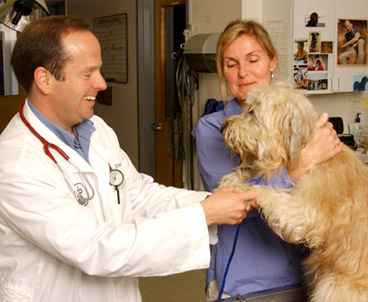 Adult Dog and Puppy Vaccines
Adult Dog and Puppy Vaccines
Core Puppy Vaccines: Distemper, Parvovirus, Bordetella, Rabies
Non-Core Puppy Vaccines: Canine Influenza, Lyme Disease, Leptospirosis
Core Adult Dog Vaccines: Rabies, Titer for Distemper and Parvovirus
Non-Core Adult Dog Vaccines: Bordetella, Canine Influenza, Lyme Disease, Leptospirosis
Adult Cat and Kitten Vaccines
Core Kitten Vaccines: FVRCP (combined Feline Viral Rhinotracheitis, Calicivirus, Panleukopenia), Rabies
Non-Core Kitten Vaccines: Feline Leukemia (for cats that go outside)
Core Adult Cat Vaccines: FVRCP, Rabies
Non-Core Adult Cat Vaccines: Feline Leukemia (for cats that go outside)
Your pet's vaccine schedule is balanced to provide needed protection while not over-vaccinating. Please contact us for more information about our customized vaccination protocols and why they are best for your pet.
Caring for Your New Puppy or Kitten
Bringing a puppy or kitten home is a very exciting time for you and your family. Your veterinarian and medical team at South Fork Animal Hospital share your joy and are here to support you with individualized puppy and kitten wellness programs, vaccinations and home care guidance.
Your puppy's or kitten's first year of care at South Fork Animal Hospital will include:
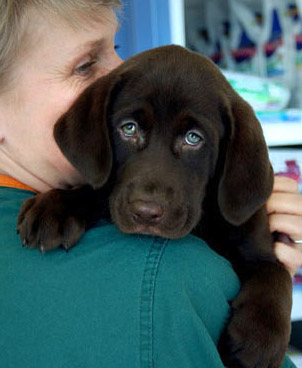 Physical Examinations: Your puppy's or kitten's lifetime of wellness starts with a comprehensive nose-to-tail physical exam. Puppies and kittens should have 3-4 exams between the ages of 8-16 weeks. These longer visits are important because they provide your veterinarian with an opportunity to assess your pet's overall health and to administer vaccines.
Physical Examinations: Your puppy's or kitten's lifetime of wellness starts with a comprehensive nose-to-tail physical exam. Puppies and kittens should have 3-4 exams between the ages of 8-16 weeks. These longer visits are important because they provide your veterinarian with an opportunity to assess your pet's overall health and to administer vaccines.- Vaccinations: Due to their developing immune systems, puppies and kittens must receive a series of properly staged vaccines. Because every puppy and kitten is unique, we tailor our vaccination recommendations based on their lifestyle and/or breed and according to the suggested medical guidelines.
- Diagnostic Testing: Puppies should be tested for Heartworm and kittens tested for Feline Leukemia and Feline AIDS.
- Extended Discussion: Do you have questions about nutrition, training, vaccinations, spaying or neutering, grooming, or parasite protection? What about tips for introducing your new pet to other pets and family members? We take plenty of time during these visits to offer health care and training advice, and talk with you about any concerns you may have.
Puppy and kitten visits are an excellent way to get your new pet started on the road to a happy and healthy life. Let's take these important first steps together. Please call today to schedule an appointment for your new pet!
Senior Pet Care
Senior Wellness Exams
This semi-annual visit includes a routine physical examination, gives you an opportunity to discuss concerns regarding your pet's age, and may include specialized lab work to detect the early signs of disease processes. Your veterinarian tailors these exams and tests to your pet's age, breed, lifestyle and physical condition to best meet his or her health needs. Because a mature pet's condition can change significantly in a short time, we recommend families bring in their senior pets approximately every 6 months.
Dental Care
Unfortunately, dental disease is all too common in pets, especially older pets, and it represents a significant systemic health risk. Because bacteria in the mouth can enter the bloodstream and be passed to other organs, periodontal disease has been found to have associations with kidney, liver, lung, and heart disease. Additionally, pets in oral distress will often have difficulty or discomfort when eating. South Fork Animal Hospital recommends regular dental exams and cleanings for all pets, but especially those in their senior years. During the months of January, February and March, all dental examinations and cleanings are discounted 15%.
Skin Conditions
As with humans, aging causes your pet's skin to become more susceptible to a range of medical issues as well as become less elastic and heal more slowly. A range of dermatological conditions can cause changes, such as hair loss and new growths; therefore, we recommend regular examinations of your pet's skin and hair, especially if you notice itching, hair loss, or painful areas.
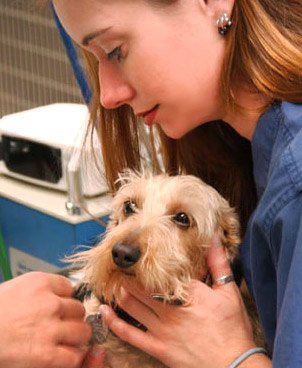 Home Care
Home Care
There is also an important role for you to play as your pet's primary caregiver. While you cannot control age-related decline, you can influence your pet's activity level, living conditions, access to quality senior veterinary care, and daily nutrition.
- Avoid excessive weight gain. Your veterinarian may recommend an exercise program as well as a special senior pet food.
- Keep your pet's living and areas clean, dry and warm at all times.
- If possible, regularly check your pet's mouth for reddened gums, loose teeth or unusual swellings. Check eyes for redness, unusual cloudiness, discomfort and discharge. Check ears for wax build-up, discharge or unusual odors.
- Thoroughly groom and inspect your older pet's skin regularly. Look for lumps, bumps and wounds.
- If your older pet's eyesight is impaired, avoid relocating furniture and changing his or her surroundings. Try not to drastically change your pet's daily routine.
- Any changes associated with eating, drinking or elimination should be noted and discussed with your veterinarian, as these may be manifestations of disease.
- Take your older pet for regular senior checkups, even if he or she seems to be well. It is always easier and less expensive to prevent a problem rather than treat a problem.
- Discuss your pet's diet. Many treats are high in sodium or fat; therefore, it is important to talk to your veterinarian about the source(s) of your pet's daily calories.
The best time to begin your pet's senior care program and recognize the need for a little extra TLC is well before age related conditions begin to set in. Together, we can make sure you and your faithful companion enjoy many more happy, healthy years together.
Flea and Tick Prevention
Fleas and ticks are more than a nuisance; they carry diseases dangerous to both you and your pet.
Prevalent tick-borne diseases in South Fork include Lyme Disease, Anaplasmosis and Ehrlichiosis, which can be significant threats to you and your dog, especially during the warmer months of the year. Ticks and tick eggs live in the grass and weeds. Check and brush your dog after being outside, especially in grassy or brushy areas. If a tick is attached to your dog's skin, remove it carefully with tweezers and wash the affected bite area and your hands afterward.
Fleas are most abundant during the warm weather; however, if left untreated, they can be a problem year-round. In fact, flea infestation is one of the most common medical problems veterinarians see. Your pet can be allergic to fleas, and even just one bite can result in a severely painful skin infection. Fleas can also transmit serious diseases such as bartonellosis (the bacteria that causes cat scratch disease in people), and parasites like tapeworms.
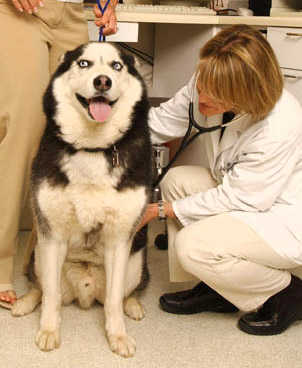 The best course of action to protect both your pet and yourself from fleas, ticks and the potential of tick-borne disease is prevention. There are many safe, effective oral and topical flea and tick control products available at South Fork Animal Hospital. Your veterinarian can help you choose the correct preventive regimen based on your pet's risk factors and health status.
The best course of action to protect both your pet and yourself from fleas, ticks and the potential of tick-borne disease is prevention. There are many safe, effective oral and topical flea and tick control products available at South Fork Animal Hospital. Your veterinarian can help you choose the correct preventive regimen based on your pet's risk factors and health status.
Heartworm Disease
Heartworm disease is a serious, life-threatening disease transmitted by mosquitoes. It affects dogs and, to a lesser extent, cats. Today, Heartworm disease is found almost everywhere in the continental United States.
Clinical symptoms of Heartworm disease develop very slowly. Early symptoms include lack of energy, exercise intolerance, coughing and difficulty breathing. Because Heartworm disease is increasing in frequency and is a serious and deadly disease, we recommend your dog be tested annually.
Fortunately, Heartworm disease prevention is simple and effective. If you would like to find out more information on how best to protect your pet from this dangerous parasite or if you'd like to have your pet tested for Heartworm disease, please call South Fork Animal Hospital today for an appointment.
For more information on all the ways the veterinary team at South Fork Animal Hospital can help you take good care of your pet, please call our office today!